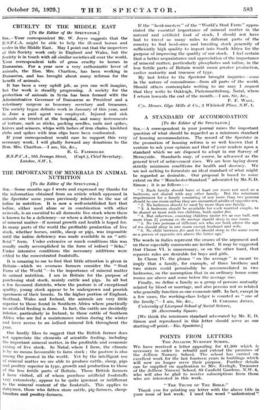THE IMPORTANCE OF MINERALS IN ANIMAL NUTRITION
[To the Editor of the SPECTATOR.]
Sut,—Some months ago I wrote and expressed my thanks for the information obtained from an article which appeared in the Spectator some years previously relative to the use of iodine in nutrition. It is now a well-established fact that iodine, either used alone or in combination with other minerals, is an essential to all domestic live stock where there is known to be a deficiency—or where a deficiency is probable of mineral matter—if normal growth and health is hoped for. In many parts of the world the profitable production of live stock, whether horses, cattle* sheep or pigs, was impossible until the iodine deficiency was made available in an " arti- ficial " form. Under extensive or ranch conditions this was usually easily accomplished in the form of iodised "licks." Under intensive conditions the necessary additions were added to the concentrated foodstuffs.
It is amazing to me to find that little attention is given in Britain—which we overseas farmers consider the "Stud Farm of the World "—to the importance of mineral matter in animal nutrition. I am in Britain for the purpose of purchasing stud stock, mainly cattle and pigs. In all but a few favoured districts, where the pasture is of exceptional quality, young stock appear to be undergrown and poorish specimens of their breeds. In the higher portion of England, Scotland, Wales and Ireland, the animals are very little superior to those found in Southern Africa where practically no artificial feeding is done. In fact, the cattle are decidedly inferior, particularly in Ireland, to those cattle of Southern Africa who are fed a maintenance ration during the winter and have access to an iodised mineral lick throughout the year.
One hardly likes to suggest that the British farmer does not appreciate the elements of scientific feeding, including the important mineral matter, in the profitable and economic raising of live stock. In Natal, where I farm, the climate is by no means favourable to farm stock ; the pasture is also among the poorest in the world. Yet by the intelligent use of mineral matter we are able to produce cattle, sheep, Pigs and poultry superior in type, growth and production to those of the less fertile parts of Britain. Those British farmers I have visited, all of whom purchase artificial foodstuffs very extensively, appear to be quite ignorant or indifferent to the mineral content of the foodstuffs. This applies to dairymen, those who fatten store cattle, pig-farmers, sheep- breeders and poultry-farmers.
If the "herd-masters" of the "World's Stud Farm" appre- ciated the essential importance of mineral matter in the natural and artificial food of stock, I should not have had to travel so many miles to different parts of the country to find herd-sires and breeding stock generally of sufficiently high quality to import into South Africa for the purpose of improving the quality of our stock. I feel certain that a better acquaintance and appreciation of the importance of mineral matter, particularly phosphates and iodine, in the less fertile parts of Britain would mean greater production, earlier maturity and trueness of type.
My last letter to the Spectator brought inquiries—some in the nature of conundrums—from all parts of the world. Should others contemplate writing to me may I request that they write to Oakleigh, Pietermaritzburg, Natal, where I return towards the end of the month.—! am, Sir, &c.,


















































 Previous page
Previous page